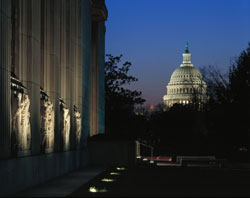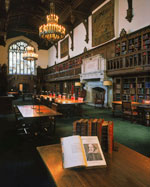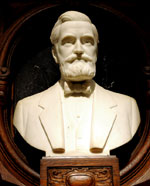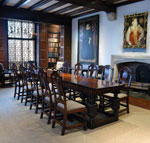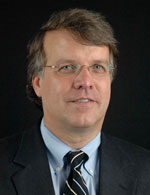Fine Focus
A university special collections library is not an independent research library. Just ask Stephen Enniss, the new librarian at the Folger Shakespeare Library. By Nicholas A. Basbanes
 Nicholas A. Basbanes recently received a National Endowment for the Humanities fellowship to work on his book on paper, which is forthcoming from Knopf. His most recent book is Editions & Impressions, a collection of essays. His other works include the acclaimed A Gentle Madness, Every Book Its Reader, Patience & Fortitude, Among the Gently Mad, and A Splendor of Letters.
Nicholas A. Basbanes recently received a National Endowment for the Humanities fellowship to work on his book on paper, which is forthcoming from Knopf. His most recent book is Editions & Impressions, a collection of essays. His other works include the acclaimed A Gentle Madness, Every Book Its Reader, Patience & Fortitude, Among the Gently Mad, and A Splendor of Letters.
Rare book and manuscript collections preserved in universities and independent research libraries come in all shapes and sizes, of course, many of them massive and multi-faceted, others compact and precisely defined.
Given the proper clearances, a person could spend days on end poking through the choice holdings of such repositories as the Houghton Library at Harvard, the Beinecke at Yale, the Ransom Research Center at the University of Texas, the Lilly at Indiana University, and barely scratch the surface of the richness and variety of the materials maintained in their sprawling stacks.
Go to the American Antiquarian Society in Worcester, Massachusetts, or the John Carter Brown Library in Providence, Rhode Island, on the other hand, and you will find daunting treasure troves as well, but the scope in each instance is explicitly laid out—American literature, history, and culture from the time of the Pilgrims to 1876 in the case of the former; a rich gathering of historical sources pertaining to the exploration and settlement of North and South America prior to 1825 at the latter.
Certainly one of the most finely focused of them all is the Folger Shakespeare Library in Washington, D.C., a great example of a library that owes its existence to the passion and determination of a single collector (the Pierpont Morgan Library in New York, the Huntington Library in San Marino, Calif., and the William Clements Library in Ann Arbor, Mich., are other outstanding examples). In this instance, the driving spirit was Henry Clay Folger, a one-time president and chairman of the Standard Oil Company, and his wife, Emily Jordan Folger, who shared his enthusiasm not only for collecting the printed works of William Shakespeare, but for carrying that determination to unequaled extremes, particularly as it pertained to the legacy of a single author.
Today, the ownership of a single copy of the first collected edition of Shakespeare’s plays, published in 1623 and known familiarly as the First Folio, is an extraordinary achievement; two of the most recent copies to go on the auction block went for $6.16 million in 2001 at Christie’s for the Abel Berland copy, and $5.2 million in 2006 at Sotheby’s in London for a copy formerly the property of the Dr. Williams’s Trust and Library. The sale of the latter occasioned the writing of The Book of William by Paul Collins, which I recently reviewed in the Los Angeles Times.
Given the extraordinary market value of this book—not to mention the immeasurable contribution it has made to world culture—imagine being escorted into the subterranean vault of the Folger Library and coming face to face with 79 copies, more than a third of the 228 known to exist, each one lying flat on its side on a large shelf against a wall, looking, as I said the first time I wrote about them in 1995, like so many bars of gold bullion in Fort Knox. I’ve been treated to this unforgettable sight twice, the first time when I was just beginning my research back in the late 1980s for A Gentle Madness, and again this past July, when I got together with the new librarian of the institution, Stephen Enniss.








